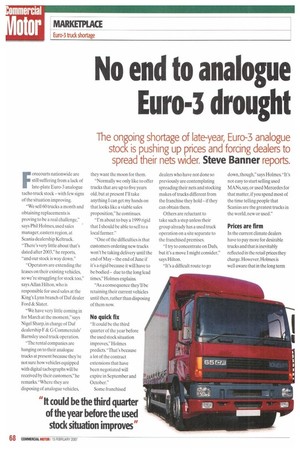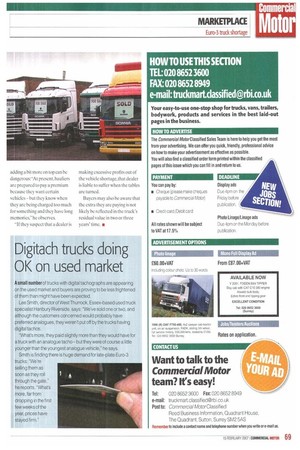No end to analogue Euro-3 drought
Page 70

Page 71

If you've noticed an error in this article please click here to report it so we can fix it.
The ongoing shortage of late-year, Euro-3 analogue stock is pushing up prices and forcing dealers to spread their nets wider. Steve Banner reports.
Forecourts nationwide are still suffering from a lack of late-plate Euro-3 analogue tacho truck stock — with few signs of the situation improving.
"We sell 60 trucks a month and obtaining replacements is proving to be a real challenge," says Phil Holmes, used sakes ' manager, eastern region, at Scania dealership Keltruck. "There's very little about that's dated after 2003," he reports, "and our stock is way down."
"Operators are extending the leases on their existing vehicles, so we're struggling for stock too," says Allan Hilton, who is responsible for used sales at the King's Lynn branch of Daf dealer Ford & Slater, "We have very little coming in for March at the moment," says Nigel Sharp, in charge of Daf dealership F & G Commercials' Barnsley used truck operation.
"The rental companies are hanging on to their analogue trucks at present because they're not sure how vehicles equipped with digital tachographs will be received by their customers," he remarks."Where they are disposing of analogue vehicles, they want the moon for them.
"Normally we only like to offer trucks that are up to five years old, but at present HI take anything I can get my hands on that looks like a viable sales proposition," he continues.
"I'm about to buy a 1999 rigid that I should be able to sell to a local farmer."
"One of the difficulties is that customers ordering new trucks won't be taking delivery until the end of May — the end of June if it's a rigid because it will have to be bodied — due to the long lead times," Holmes explains.
"As a consequence they'll be retaining their current vehicles until then, rather than disposing of them now.
No quick fix
"It could be the third quarter of the year before the used stock situation improves," Holmes predicts. "That's because a lot of the contract extensions that have been negotiated will expire in September and October."
Some franchised dealers who have not done so previously are contemplating spreading their nets and stocking makes of trucks different from the franchise they hold — if they can obtain them.
Others are reluctant to take such a step unless their group already has a used truck operation on a site separate to the franchised premises.
"I try to concentrate on Dafs, but it's a move! might consider," says Hilton.
"It's a difficult route to go down, though," says Holmes. "It's not easy to start selling used MANS, say, or used Mercedes for that matter, if you spend most of the time telling people that Scanias are the greatest trucks in the world, new or used."
Prices are firm
In the current climate dealers have to pay more for desirable trucks and that is inevitably reflected in the retail prices they charge. However, Holmes is well aware that in the long term adding a bit more on top can be dangerous: "At present, hauliers are prepared to pay a premium because they want certain vehicles — but they know when they are being charged too much for something and they have long memories," he observes.
"If they suspect that a dealer is making excessive profits out of the vehicle shortage, that dealer is liable to suffer when the tables are turned.
Buyers may also be aware that the extra they are paying is not likely be reflected in the truck's residual value in two or three years' time.


























































































































































































